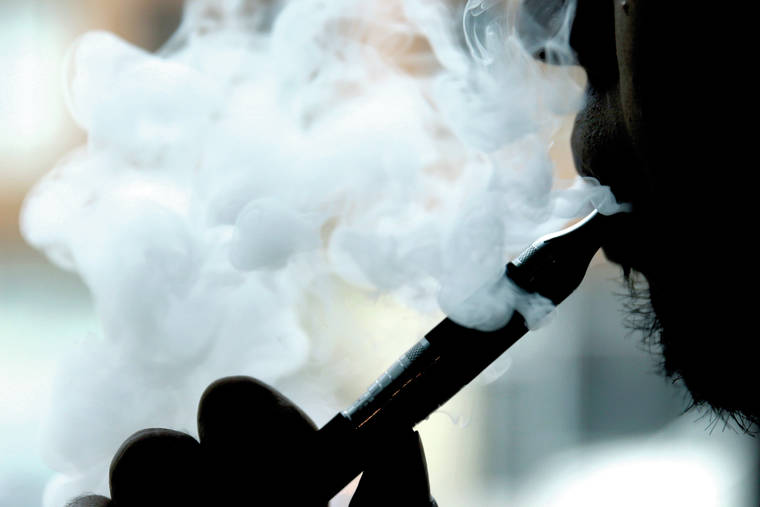State DOH investigating lung injury; incident could be related to vaping
A Big Island youth has a serious lung injury possibly related to the use of electronic smoking devices, or vaping, said state health officials Tuesday.
The state Department of Health is investigating the incident, which was reported earlier this week, and health officials are “aggressively gathering patient information to determine the cause of the illness,” the DOH said in a news release.
ADVERTISING
The individual is hospitalized and receiving treatment.
A DOH spokeswoman declined to reveal where on the island the report was made or the age of the patient, who is younger than 18, citing privacy concerns.
The Centers for Disease Control, U.S. Food and Drug Administration and other state and local health agencies are investigating a multistate outbreak of severe pulmonary disease associated with e-cigarette products.
More than 450 potential or confirmed cases of severe lung injury associated with the use of e-cigarette products, including six deaths, have been reported in 33 states and one U.S. territory, according to the CDC.
To date, there have been no confirmed cases in Hawaii of lung injuries associated with vaping, the DOH said.
Sally Ancheta, Hawaii Island community coordinator, said the Tobacco-Free Hawaii Island coalition was not surprised to hear about the hospitalization.
As a member of the Coalition for a Tobacco-Free Hawaii, a program of the Hawaii Public Health Institute, “we have been advocating, training and educating our community about the harms of tobacco and vape use since 2003,” she said. “We are very concerned as the number of severe respiratory illness has risen so quickly on the mainland, and we have seen six deaths in the past few weeks.”
The Big Island has the “highest youth use rates,” with 32% of high school students and 19% of middle school students using e-cigarette devices, according to Ancheta.
“We have also had several elementary schools report second- and third-graders have been caught using a vape device on campus, both in East and West Hawaii.”
Ancheta said kids perceive vaping as safe, but it’s anything but harmless vapor.
According to the CDC, e-cigarettes produce an aerosol by heating a liquid that usually contains nicotine, flavorings and other chemicals to help make the aerosol, which users then inhale into their lungs. E-cigarettes also can be used to deliver marijuana or other substances.
The aerosol can contain nicotine, ultra-fine particles that can be inhaled deep into the lungs, chemical flavorings linked to a serious lung disease, volatile organic compounds, cancer-causing chemicals and heavy metals such as nickel, tin and lead, the CDC said.
While the CDC investigation has not identified specific substances or e-cigarette products linked to all cases, many of these cases reported using liquids with cannabinoid products, such as THC.
“We are cautioning people about using e-cigarettes and advise against using unregulated THC-containing vaping products,” said state Health Director Bruce Anderson in the news release. “We are monitoring the situation locally and nationally, and coordinating with federal and state partners to stay up to date on the latest information available. We have alerted Hawaii health care providers and emergency workers of this issue so they are aware, and will continue to investigate this possible local case and work to determine the cause of their illness.”
The Hawaii Educational Association of Licensed Therapeutic Healthcare, a trade association for all Hawaii-licensed medical cannabis dispensaries, said in a statement that licensed dispensaries are required to submit “every batch of flower and manufactured product” for analysis by a third-party lab regulated by the state.
The state does not allow any solvents, solvent residues or contaminants in medical cannabis products sold in licensed dispensaries, and any cannabis products not passing stringent lab standards for purity must be destroyed.
Hawaiian Ethos, a Big Island medical cannabis dispensary, said in a news release that it takes the safety of patients and the community seriously and was concerned to hear recent news of deaths and injuries surrounding vaping.
“Every extract sold in our dispensary comes straight from the plant with absolutely no additives, from the beginning of the processing to the finished product,” the company said.
The DOH urges physicians to be on alert for signs of severe respiratory illness among patients who recently used vaping products, including e-cigarettes and THC products, and report any cases.
A medical advisory with guidance was sent Tuesday to all physicians statewide.
Symptoms of acute severe pulmonary disease associated with vaping or use of an e-cigarette device might include cough, shortness of breath, chest pain, weight loss, dizziness, nausea, vomiting, abdominal pain, diarrhea and fever.
Anyone who uses e-cigarette products should monitor themselves for symptoms and promptly seek medical attention for any health concerns, the DOH said.
The DOH also advised people to avoid e-cigarette products off the street and not modify e-cigarette products or add any substances that are not intended by the manufacturer.
E-cigarette products should never be used by youth, young adults, pregnant women or adults who do not currently use tobacco products, the DOH said.
For anyone who wants to quit smoking or vaping, the Hawaii Tobacco Quitline offers free nicotine-replacement therapy and assistance regardless of insurance status. Call 1-800-QUITNOW or visit hawaiiquitline.org.
Those who are concerned about their health after using an e-cigarette product should contact their health care provider.
For medical advice, the public also can call the Hawaii Poison Center Hotline at 1-800-222-1222, which is staffed around the clock with trained nurses, pharmacists and toxicologists, or visit hipoisoncenter.org.
Email Stephanie Salmons at ssalmons@hawaiitribune-herald.com.





